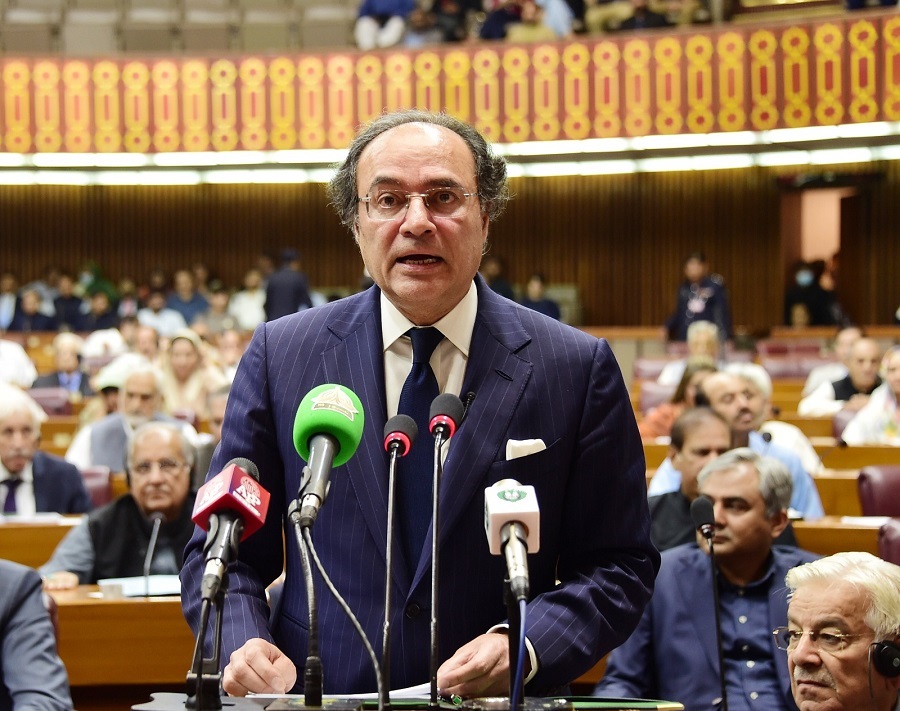ISLAMABAD, Pakistan: The Federal Budget 2024-25 with a total outlay of Rs 18,877 billion was announced on Wednesday with focus on fiscal consolidation and relief measures for the common man.
Presenting the budgetary proposals in the National Assembly, the Finance Minister Muhammad Aurangzeb said that the gross revenue receipts have been estimated at Rs 17,815 billion.
These include the Federal Board of Revenue’s (FBR) revenue collection of Rs 12,970 billion and non-tax revenue Rs 4,845 billion. The share of provinces in the federal receipts will be Rs 7,438 billion.
The finance minister said that the growth rate is expected to be 3.6 percent during the next Fiscal Year 2024-25.
The inflation is expected to be 12 percent, budget deficit 6.9 percent of Gross Domestic Product (GDP) and primary surplus will be one percent of GDP, he said also adding that Rs 9,775 billion will be paid for interest payment.
Muhammad Aurangzeb said that Rs 1,400 billion have been earmarked for the Public Sector Development Programme (PSDP).
An additional Rs 100 billion have been allocated through the Public-Private Partnership.
The finance minister said that the development budget will be at the historic level of Rs 1,500 billion. He added that Rs 2,122 billion will be provided for defence requirement.
The minister said that Rs 839 billion have been reserved for the expenditure of civil administration while Rs 1,014 billion have been set aside for pension expenditure and Rs 1,363 billion have allocated as subsidy on electricity, gas and other sectors.
بی آئی ایس پی کی مختص رقم میں 27 فیصد اضافہ, وفاقی وزیر برائے خزانہ محمد اورنگزیب
اس سال بی آئی ایس پی کے لیے 593 ارب روپے کی رقم مقرر، وفاقی وزیر برائے خزانہ محمد اورنگزیب
امید ہے اس سال کے اختتام تک سرکلر ڈیٹ سٹاک میں کوئی اضافہ نہیں ہوگا، وفاقی وزیر برائے خزانہ محمد… pic.twitter.com/AsggrLo8Qk
— National Assembly (@NAofPakistan) June 12, 2024
Muhammad Aurangzeb said that grants worth Rs 1,777 billion have been earmarked for Benazir Income Support Programme (BISP), Azad Jammu and Kashmir (AJK), Gilgit-Baltistan (GB), merged districts, Higher Education Commission (HEC), Pakistan Railways, and IT Sector.
The finance minister said that the major volume of development budget manifests the government’s resolve to develop infrastructure, transportation, energy and IT Sectors as well as address the challenges in the management of water resources.
Muhammad Aurangzeb said that completion of ongoing projects will be given priority in the PSDP 2024-25. He pointed out that 81 percent resources have been allocated for the ongoing projects and 19 percent for the new projects.
The minister also said that development of basic infrastructure is the basic responsibility of the government and for this purpose it has been proposed to allocate 59 percent of the amount.
For the social sector, it is proposed to spend 20 percent of the development budget.
The finance minister said that ensuring balanced regional development is a constitutional responsibility.
Hence, 10 percent resources have been earmarked for AJK, GB and the tribal districts about 11.2 percent resources have been set aside for other sectors such as IT and telecom, science and technology, governance and production.
While announcing three-pronged strategy to reduce pension bill, Muhammad Aurangzeb said that reforms will be introduced in the existing pension scheme as per international best practices that would considerably decrease pension liability for the next three decades.
Unveiling relief measures, the finance minister announced 25 percent increase in the salaries of government employees from Grade-1 to 16 and 20 percent from Grade-17 to 22.
The minister also proposed 15 percent raise in the pension of retired government employees.
The minimum wages are being increased from Rs 32,000 to Rs 37,000.
The minister said that taxes on vehicles’ registration and purchase up to 2000 CC were taken on the basis of engine capacity. However, it has been proposed in the budget that tax on all the vehicles would be taken on prices of vehicles instead of its engine capacity as it was enforced earlier.
